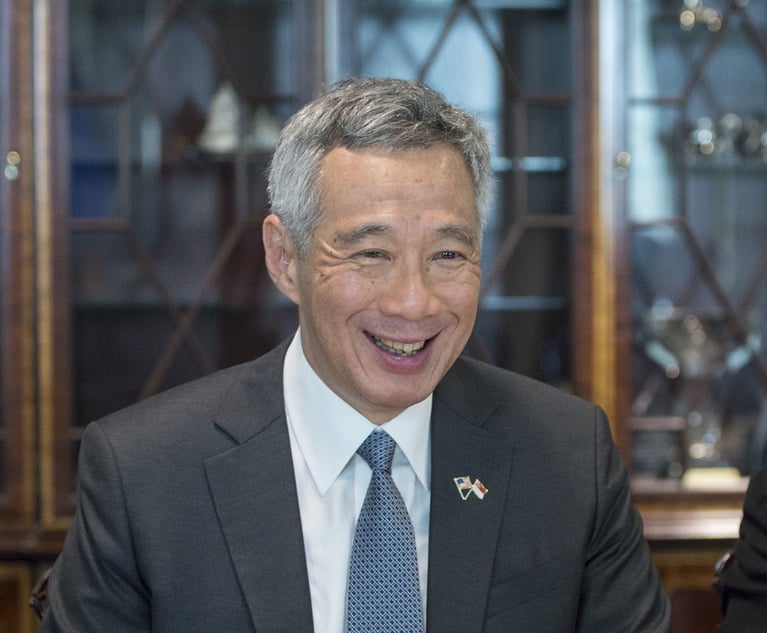Singapore appoints committee to guide third law school development
Singapore's Ministry of Law (MinLaw) has selected a 12-member steering committee to guide the development of its third law school. The school, to be located at the Singapore Institute of Management's SIM University, was approved earlier this year in response to a perceived shortage of lawyers in the region, particularly those specialising in family and criminal law.
November 26, 2013 at 10:55 PM
3 minute read
Singapore's Ministry of Law (MinLaw) has selected a 12-member steering committee to guide the development of its third law school.
The school, to be located at the Singapore Institute of Management's SIM University, was approved earlier this year in response to a perceived shortage of lawyers in the region, particularly those specialising in family and criminal law.
The steering committee includes legal professionals from the private and public sectors, including the senior partner at RHTLaw Taylor Wessing Subhas Anandan, and is chaired by Singapore's senior minister of state for education and law Indranee Rajah.
It is expected to provide strategic direction for the school on matters such as the educational philosophy, admissions criteria and curriculum, and will be supported by a nine-member working group which will make recommendations on the development of the curricular framework.
It will be the first privately-funded law school in Singapore, offering training in all key areas such as contract law, company law, tort law, property law and trusts law.
The curriculum is also expected to include the study of complementary subjects such as psychology, accounting and forensics, whilst work experience and exposure to pro bono efforts will be an integral part of the course.
"The third law school will seek to provide a strong foundation in all core law subjects," said Rajah.
"A strong emphasis on multi-disciplinary and applied learning will be another unique feature of this school."
With reportedly just 200 law graduates per year, Singapore has long been concerned with a shortage of lawyers, and in May this year a committee on the supply of lawyers chaired by Justice VK Rajah made recommendations to the government to establish a new law school.
Legal training is currently offered at just two universities, the National University of Singapore and Singapore Management University, both of which are state-funded.
A growth in Singapore lawyers might be also seen as increasingly important as MinLaw takes further steps to open up the country's legal market to foreign outfits.
Whilst 10 international law firms now have local or Qualifying Foreign Law Practice (QFLP) licences, and are thus thought to be eyeing more Singapore law capability, other firms are understood to be mulling plans for local joint venture arrangements.
Related: Open season – the influx of global firms making their mark in Singapore
This content has been archived. It is available through our partners, LexisNexis® and Bloomberg Law.
To view this content, please continue to their sites.
Not a Lexis Subscriber?
Subscribe Now
Not a Bloomberg Law Subscriber?
Subscribe Now
NOT FOR REPRINT
© 2025 ALM Global, LLC, All Rights Reserved. Request academic re-use from www.copyright.com. All other uses, submit a request to [email protected]. For more information visit Asset & Logo Licensing.
You Might Like
View All
Singapore Leaders Stress the Importance of the Rule of Law Amid Geopolitical Tensions

Can Law Firms Avoid Landing on the 'Enemy' List During the Trump Administration?
5 minute read

Letter From Asia: Will Big Law Ever Bother to Understand Asia Again?
Trending Stories
- 1Trump Administration Faces Legal Challenge Over EO Impacting Federal Workers
- 2Supreme Court Considers Reviving Lawsuit Over Fatal Traffic Stop Shooting
- 3Long Hours and Lack Of Boundaries: Associates In India Are Leaving Their Firms
- 4Goodwin Procter Relocates to Renewable-Powered Office in San Francisco’s Financial District
- 5'Didn't Notice Patient Wasn't Breathing': $13.7M Verdict Against Anesthesiologists
Who Got The Work
J. Brugh Lower of Gibbons has entered an appearance for industrial equipment supplier Devco Corporation in a pending trademark infringement lawsuit. The suit, accusing the defendant of selling knock-off Graco products, was filed Dec. 18 in New Jersey District Court by Rivkin Radler on behalf of Graco Inc. and Graco Minnesota. The case, assigned to U.S. District Judge Zahid N. Quraishi, is 3:24-cv-11294, Graco Inc. et al v. Devco Corporation.
Who Got The Work
Rebecca Maller-Stein and Kent A. Yalowitz of Arnold & Porter Kaye Scholer have entered their appearances for Hanaco Venture Capital and its executives, Lior Prosor and David Frankel, in a pending securities lawsuit. The action, filed on Dec. 24 in New York Southern District Court by Zell, Aron & Co. on behalf of Goldeneye Advisors, accuses the defendants of negligently and fraudulently managing the plaintiff's $1 million investment. The case, assigned to U.S. District Judge Vernon S. Broderick, is 1:24-cv-09918, Goldeneye Advisors, LLC v. Hanaco Venture Capital, Ltd. et al.
Who Got The Work
Attorneys from A&O Shearman has stepped in as defense counsel for Toronto-Dominion Bank and other defendants in a pending securities class action. The suit, filed Dec. 11 in New York Southern District Court by Bleichmar Fonti & Auld, accuses the defendants of concealing the bank's 'pervasive' deficiencies in regards to its compliance with the Bank Secrecy Act and the quality of its anti-money laundering controls. The case, assigned to U.S. District Judge Arun Subramanian, is 1:24-cv-09445, Gonzalez v. The Toronto-Dominion Bank et al.
Who Got The Work
Crown Castle International, a Pennsylvania company providing shared communications infrastructure, has turned to Luke D. Wolf of Gordon Rees Scully Mansukhani to fend off a pending breach-of-contract lawsuit. The court action, filed Nov. 25 in Michigan Eastern District Court by Hooper Hathaway PC on behalf of The Town Residences LLC, accuses Crown Castle of failing to transfer approximately $30,000 in utility payments from T-Mobile in breach of a roof-top lease and assignment agreement. The case, assigned to U.S. District Judge Susan K. Declercq, is 2:24-cv-13131, The Town Residences LLC v. T-Mobile US, Inc. et al.
Who Got The Work
Wilfred P. Coronato and Daniel M. Schwartz of McCarter & English have stepped in as defense counsel to Electrolux Home Products Inc. in a pending product liability lawsuit. The court action, filed Nov. 26 in New York Eastern District Court by Poulos Lopiccolo PC and Nagel Rice LLP on behalf of David Stern, alleges that the defendant's refrigerators’ drawers and shelving repeatedly break and fall apart within months after purchase. The case, assigned to U.S. District Judge Joan M. Azrack, is 2:24-cv-08204, Stern v. Electrolux Home Products, Inc.
Featured Firms
Law Offices of Gary Martin Hays & Associates, P.C.
(470) 294-1674
Law Offices of Mark E. Salomone
(857) 444-6468
Smith & Hassler
(713) 739-1250








